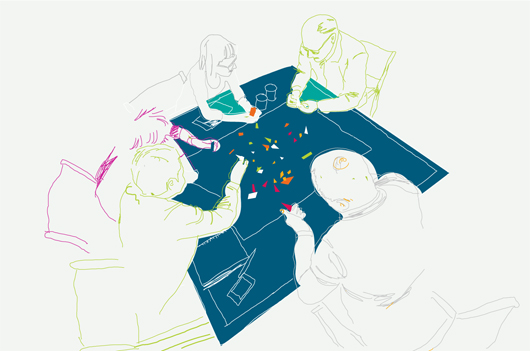Benefits of the CPF
There are several benefits to becoming an IAF CertifiedTM Professional Facilitator (CPF), both during the assessment process, as well as upon successful completion.
During the assessment process, a facilitator is able to:
- Reflect on his or her facilitation practice relative to the IAF Core Competencies;
- Benchmark his or her facilitation skills against a set of carefully researched, internationally recognised, and successfully tested competencies;
- Experience the facilitation skills of other facilitators;
- Receive confidential, individual feedback from independent professional facilitators, which can serve as invaluable input to on-going professional development;
Upon successful competition of the CPF assessment, the facilitator will:
- Receive a formal certificate for display;
- Be entitled to use the IAF CertifiedTM Professional Facilitator designation, for as long as IAF membership is maintained and recertification is undertaken every three years;
- Join a respected group of certified professional facilitators;
- Gain the competitive advantage of being listed in the Association’s online Directory of IAF CertifiedTM Professional Facilitators.
A high point on my CPF assessment day was the opportunity to see varying styles from other all-star facilitators. The feedback from the assessors was priceless - it's rare that a facilitator gets candid feedback about their practice from people qualified to provide it!" (Becky R., CPF, Washington, DC, USA)

Why choose the IAF CertifiedTM Professional Facilitator?
Becoming an IAF CertifiedTM Professional Facilitator requires a commitment of time, effort, and money. A facilitator should undertake the process with the confidence that he or she is getting a recognized designation, one that is credible, valid, reliable, and well worth the investment.
Below are some of the reasons why the IAF’s CPF designation is a highly valued credential and the best option for facilitators seeking professional accreditation in the global marketplace
Credibility
- The IAF CertifiedTM Professional Facilitator is offered by the only global professional body for facilitators. The IAF has members in over 65 countries and CPF assessments have taken place on six continents.
- The CPF designation is linked to the IAF’s Statement of Values and Code of Ethics, a globally developed set of professional standards.
- The CPF is the only facilitator certification that is not connected to a commercial business, training program, or institutional sponsor. The IAF’s only commitment is to contribute to the growth and development of the facilitation profession.
- Every facilitator who has the CPF, regardless of reputation or experience, has earned it the same way: through the documentation and demonstration of their knowledge and skills. No one has ever been grandfathered into the certification.
Validity
- The IAF Core Competencies, upon which the CPF is based, have been developed, researched, and refined through the collective wisdom of IAF members, some of whom are pioneers of process facilitation.
- The CPF program was developed from the IAF Core Competencies and by a multinational team. By contrast, many facilitator assessments developed their competency set while also creating their assessment system. This runs the risk of creating competencies that reflect the unconscious biases of assessors.
- The program has undergone periodic review and renewal to ensure it remains a performance-based certification. The guiding principles are that it must produce valid and defensible decisions on competence.
- The CPF Assessment includes a face to face event allowing Assessors to experience the facilitator’s skills, and the responses and reactions of participants, first hand in a way that is simply not possible using video.
Reliability
- The IAF runs 10 to 12 Assessment events per year. More than 1200 Facilitators have undergone assessment through the IAF’s CPF program. In the nearly twenty-year history of the program many lessons have been learned, which have improved and strengthened the program. No other Facilitator assessment can demonstrate this level of experience and practice.
- The CPF uses the perspectives of four Assessors and a consensus-based process to make the certification decision. The IAF understands the complexity of facilitation practice, and the dangers of subjectivity and cognitive biases common in any system that uses a small number of Assessors and/or rating scales.
- The CPF assessment uses Process Managers to supervise the assessment team and ensure a consistent application of the assessment process, regardless of location or language.
Flexibility
- The CPF is not connected to any particular training, philosophy, or approach to facilitation. The IAF has certified individuals with PhDs and years of education behind them. We have also certified Facilitators who have been entirely self-taught. Assessors look for competence. The individual journey is of interest but, in the end, it is knowledge and skills that matter.
- The program has assessed and certified facilitators working with a diverse range of organisations and groups (e.g. corporate, public, indigenous, not for profit, etc.) with the competencies proving equally applicable in all.
- The CPF asks applicants to document seven facilitated events in the previous three years: not the first seven, or the most recent seven. Rather it’s the candidate’s best seven, meaning those that demonstrate a range of competencies, knowledge, and experience. The IAF understands that quantity is not quality.
- The CPF assumes that being professional is not just a matter of working full time as a facilitator. Rather, it is about adhering to the highest standards of group process facilitation. Both full time facilitators, and those who use their skills as a tool set in the context of other work, can be considered professional.
Accessibility
|
Recognition
- The CPF has been recognised as a valuable credential by several national and regional governments, and international agencies, some of whom have used it as a prerequisite for responding to request for services.
- CPF’s are listed in a public directory on the IAF website, along with clear guidance for clients about the benefits of working with a CPF.
Return of Investment
|
For additional information please contact the IAF’s Director of Professional Development.